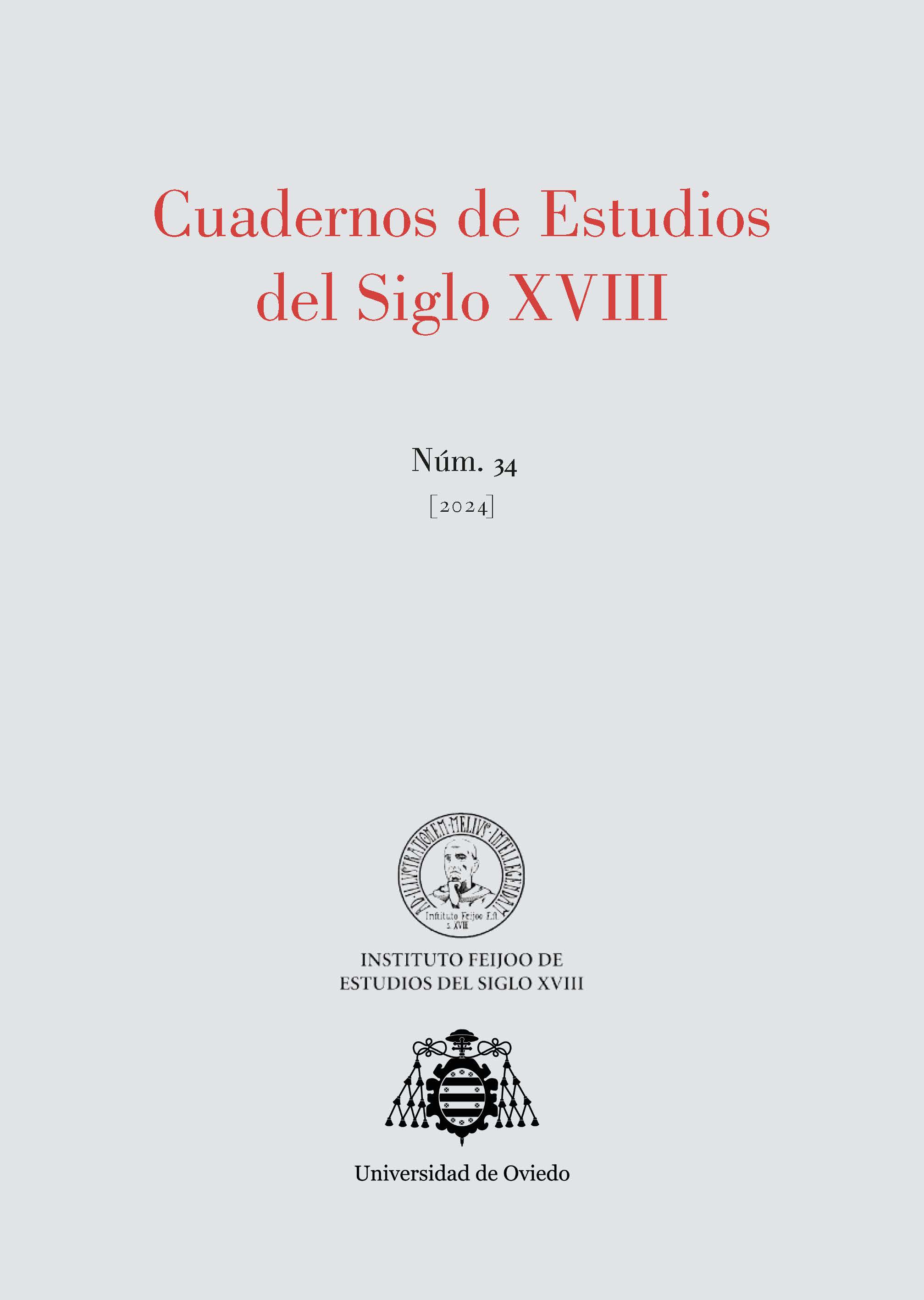Abstract
Throughout the 18th century, the genre of literary biography was renewed. Collective biographies of poets were written as new national literatures were conceived. These biographies show a tension between characterization and the singularization of each subject; at the same time, they were an ideal space for the codification of a particular authorial conceptions. This paper examines the biographies of Spanish poets which were included in Johann Andreas Dieze’s notes to his translation of Velázquez's Orígenes de la poesía castellana in 1769. The paper contextualizes his biographies in relation to the tradition and sources he followed, the importance of these in the plan of the translation, and the general influence of expressive poetic theories in his treatment of the biography.
References
ABRAMS, Meyer Howard (1974), The Mirror and the Lamp. Romantic Theory and the Critical Tradition, Oxford, Oxford University Press.
ÁLVAREZ BARRIENTOS, Joaquín (2010), «Martín Sarmiento (1695-1772) y Luis José Velázquez (1722-1772) en los orígenes de la historia literaria española», en Gramática, canon e historia literaria (1750-1850), eds. Victoriano Gaviño Rodríguez y Fernando Durán López, Madrid, Visor Libros, págs. 11-48.
ANÓNIMO (1770), «Don Luis Velázquez Geschichte der spanischen Dichtkunst. Aus dem Spanischen übersetzt und mit Anmerkungen erläutert von J. A. Dieze. Göttingen 1769», en Allgemeine historische Bibliothek von Mitgliedern des königlichen Instituts der historischen Wissenschaften zu Göttingen, ed. Johann Christoph Gatterer, t. 13, Halle, Johann Justinus Gebauer, págs. 27-54.
ARADRA SÁNCHEZ, Rosa María (2021), «Las biografías de autor en la construcción de la historia literaria», Studi Ispanici, vol. XLVI, págs. 297-318.
BENAVENT MONTOLIU, Jorge F. (1998), «Gregorio Mayans y el Hispanismo alemán en el siglo XVIII», Saitabi, n.º 48, págs. 27-50.
BERCHEM, Theo (1997), «Diezes Versuch einer Gesamtschau der spanischen Geschichte und Kultur», en Zum Spanienbild der Deutschen in der Zeit der Aufklärung, ed. Hans Juretschke, Münster, Aschendorff, págs. 187-206.
BERTRAND, Jean Jacques Achille (1922), «Figures d’hispanologues», Bulletin Hispanique, n.º 24 (4), págs. 343-360.
BOUTERWEK, Friedrich (1804), Geschichte der Poesie und Beredsamkeit seit dem Ende des dreizehnten Jahrhunderts, vol. 3, Gotinga, Johann Friedrich Röwer.
BUTTENSCHOEN, Johann Friedrich (1789), «Versuch über die spanische schöne Litteratur», en Leiden zweyer edlen Liebenden nach dem Spanischen des Don Miguel de Cervantes Saavedra, nebst dem merkwüridgen Leben dieses berühmten Spaniers und einem Versuche über die Spanische schöne Litteratur von Johann Friedrich Butenschoen, Heidelberg, Friedrich Ludwig Pfähler, págs. XXXVI-XCV.
CAMPA, Mariano de la (2019), «Luis José Velázquez (1722-1772), un ilustrado en la República de las Letras», Anejos de Dieciocho, n.º 5, págs. 81-103.
CHECA BELTRÁN, José (2019), «Canon, política y redes en la historiografía literaria del siglo XVIII español», en En los inicios ilustrados de la Historiografía Literaria Española: Miradas sobre la Edad Media y el Siglo de Oro (1700-1833), eds. Jesús Cañas Murillo y José Roso Díaz, San Millán de la Cogolla, Cilengua, págs. 67-87.
COMELLAS, Mercedes (2014), «La novela interesante o la verdad de las novelas entre Romanticismo y Realismo», Boletín de la Biblioteca de Menéndez Pelayo, vol. LXL, págs. 90-142.
— (2019), «Genio romántico e imagen autorial desde los inicios del siglo XIX hasta Espronceda», Bulletin hispanique, n.º 121 (2), págs. 683-708.
— (2021), «Vida, verdad y poesía: la sinceridad de Herrera y la revisión romántica de su biografía», Studi Ispanici, vol. XLVI, págs. 319-354.
CRONEGK, Johann Friederich von (1761), Schriften, vol. 2, Leipzig, Johann Christoph Posch.
DIEZE, Johann Andreas (trad.), Velázquez de Velasco, Luis José (1769), Geschichte der Spanischen Dichtkunst. Aus dem Spanischen übersetzt und mi Anmerkungen erläutert, Gotinga, Victorinus Bossiegel.
ECK, Reimer (1997), «Entstehung und Umfang der spanischen Büchersammlung der Universitätsbibliothek Göttingen in 18. Jahrhundert», en Zum Spanienbild der Deutschen in der Zeit der Aufklärung, ed. Hans Juretschke, Münster, Aschendorff, págs. 87-132.
ESTEVE, Cesc (2021), «Vidas en serie. Discurso biográfico y figuración de autor en Escritores del reino de Valencia (1747-1749) de Vicente Ximeno», Studi Ispanici, vol. XLVI, págs. 207-229.
HEMECKER, Wilhelm y Edward SAUNDERS (2017) (eds.), Biography in Theory: Key Texts with Commentaries, Berlin / Boston: De Gruyter, 2017.
HENDRIKSON, Thomas (2020), «Ancient Biography and the Italian Renaissance: Old Models and New Developments», en The Oxford Handbook of Ancient Biography, ed. Koen de Temmerman, Oxforf, Oxford University Press, págs. 563-574.
HOFFMEISTER, Gerhart (1980), España y Alemania. Historia y documentación de sus relaciones literarias, Isidro Gómez Romero (trad.), Madrid, Editorial Gredos.
KLEIN, Christian (2022) (ed.), Handbuch Biographie: Methoden, Traditionen, Theorien, aktualisierte und erweiterte Auflage, Heidelberg, J.B. Metzler.
LESSING, Gotthold Ephraim (1902), Sämtliche Schriften, ed. Karl Lachmann, t. 17, Leipzig, G. H. Göschen’sche Verlagshandlung.
MEREGALLI, Franco (1988), «De Luis J. Velázquez a Johann A. Dieze», en Coloquio internacional sobre el teatro español del siglo XVIII, eds. Maurizio Fabbri, Rinaldo Froldi, y Mario di Pinto, Abano Terme, Piovan Editore, págs. 303-313.
MESTRE SANCHIS, Antonio (1995), «La erudición, del Renacimiento a la Ilustración», Bulletin Hispanique, vol. 97 (1), págs. 213-232.
OLMO IBÁÑEZ, María Teresa del (2015), Teoría de la biografía, Madrid, Clásicos Dykinson.
RODRÍGUEZ AYLLÓN, Jesús Alejandro (2010), Un hito en el nacimiento de la Historia de la literatura española: los Orígenes de la poesía castellana (1754) de Luis José Velázquez, Málaga, Fundación Unicaja.
— (2013), «Introducción», a Luis José Velázquez de Velasco, Orígenes de la poesía castellana, Málaga, Universidad de Málaga.
ROMÁN GUTIÉRREZ, Isabel (2019), «Del ingenio barroco al genio ilustrado: los prolegómenos de la imagen autorial del genio en España», Bulletin Hispanique, vol. 121 (2), págs. 645-682.
ROMERO TOBAR, Leonardo (1987), «Nicolás Antonio y los aragoneses contemporáneos», Cuadernos de Aragón, n.º 20, págs. 205-210.
RUIZ PÉREZ, Pedro (2021), «Biografías bajobarrocas de poetas: entre retórica y ficción», en Atardece el Barroco. ficción experimental en la España de Carlos II (1665-1700), eds. Jorge García López, Enrique García Santo-Tomás, Madrid / Frankfurt, Iberoamericana / Vervuert, págs. 93-118.
SAFRANSKI, Rüdiger (2009), Romanticismo. Una odisea del espíritu alemán, Barcelona, Tusquets.
SULZER, Johann George (1773), Allgemeine Theorie der Schönen Künste: in einzeln, nach alphabetischer Ordnung der Kunstwörter auf einander folgenden, Artikeln abgehandelt. 1,1: A bis D, Leipzig, Weidmann und Reich.

This work is licensed under a Creative Commons Attribution-NonCommercial-NoDerivatives 4.0 International License.
Copyright (c) 2024 Carmen Calzada Borrallo


